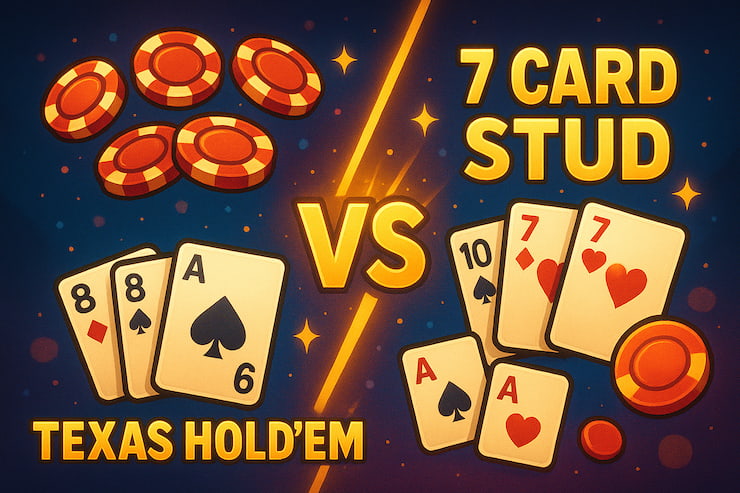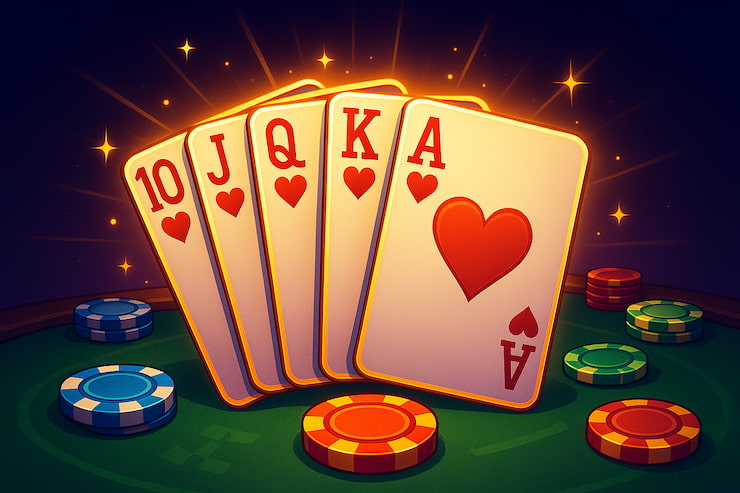Online Poker has been played in many forms over the years, and 7 card stud rules is one of the originals that shaped the game’s history. Before Texas Hold’em exploded in popularity, Stud was the go-to choice in casinos and home games. It’s a game that rewards patience, careful observation, and the ability to remember what cards have already been played.
Today, Seven Card Stud still has its place in cash games, mixed-game formats, and online poker rooms. This page breaks down everything needed to understand how the game works, from rules and hand rankings to strategy tips to improve your odds, whether you’re a beginner or an advanced poker player.
What Is 7 Card Stud?
Seven Card Stud is one of the oldest and most respected poker games. Before Texas Hold’em became the modern favorite, it was available in nearly every casino and home game.
In this variant, each player gets seven cards, with some face down and some face up for the whole table to see. Since there aren’t any community cards, you’re building your hand entirely from the cards you’re dealt.
What makes Stud interesting is how much it depends on observation. You can see part of your opponents’ hands as they’re dealt, so paying attention to exposed cards is just as important as knowing what’s in your hand. That makes the game slower than Hold’em, but many players enjoy the extra layer of strategy it brings.
Although it isn’t as popular as it used to be, Seven Card Stud still has a strong presence in cash games, mixed-game tournaments, and online poker rooms. Many players enjoy it for the tradition, the mental challenge, and the different kind of strategy it brings compared to fast-paced community card games. You can even find it at some Bitcoin Poker Sites, and Ethereum Poker Sites where players combine classic poker action with the benefits of crypto transactions.
Seven Card Stud vs. Texas Hold’em
Texas Hold’em may be the most popular poker game today, but it plays very differently from Seven Card Stud. In Hold’em, players share the same community cards and combine them with their two hole cards to make the best hand. In Stud, there are no community cards at all. Each player receives seven cards of their own, and only their five best count at showdown.
Another significant difference is how the game unfolds and the number of rounds. Stud has more betting rounds, with cards revealed one at a time, so the pace is slower and requires more patience. Observation is also a bigger part of the game. Because several of each opponent’s cards are visible, you can pick up valuable clues about the strength of their hand as the betting develops.
If you like action and fast decisions, Hold’em might feel more exciting. On the other hand, if 7 Card Stud rewards patience, an eye for detail, and a good memory, offering a deeper, more strategic style of poker.
Basic Rules of 7 Card Stud
The basic 7 Card Stud rules are simple once you see how the game unfolds step by step. Each player antes before the deal, then receives seven cards across several betting rounds.
Unlike Hold’em, where community cards drive the action, Stud requires you to focus on the cards in your hand and the exposed cards of your opponents. This makes the game more methodical because decisions are shaped by what’s already visible on the table and what you believe is still in play.
The Goal of the Game
The goal in 7 Card Stud is to make the best possible five-card hand from the seven you’re dealt. This follows the standard poker hand rankings, which means familiar combinations like flushes, straights, and full houses still apply.
Antes and the Bring-In
Every round begins with an ante, a small forced bet that gets the pot started. After the first three cards are dealt, the player with the lowest up card must place the bring-in bet.
Third Street
Players are dealt two face-down cards and one face-up card. After the bring-in, betting moves clockwise. This is the first moment where players start sizing up their hand and the exposed cards on the table.
Fourth Street
Each player gets another card face up. At this stage, you start to see whether a hand has potential to become strong or should be folded.
Fifth Street
Players receive their third face-up card. In limit games, the size of bets usually increases from this round forward, so decisions carry more weight at this point.
Sixth Street
Each player is dealt another face-up card. By now, most players have a good idea of what their opponents may be holding based on the exposed cards. Strategy becomes more about observation and careful decision-making.
Seventh Street (The River)
The final card is dealt face down. Each player now has seven cards and one last chance to bet before the showdown.
Showdown and Winning Hands
Any remaining players reveal their cards, and the best five-card hand wins the pot. Because everyone has their own set of cards, 7 Card Stud rules rely heavily on reading the board and piecing together what hands are still possible.
7 Card Stud Poker Hand Rankings
To play confidently, you need to understand how the hand rankings work. The good news is that 7 Card Stud rules use the same hand rankings as most other forms of poker. Your job is to build the strongest five-card hand out of the seven you receive.
Here’s the order from strongest to weakest:
| Hand | Description |
| Royal Flush | Ten, Jack, Queen, King, Ace of the same suit. |
| Straight Flush | Five cards in sequence, all in the same suit. |
| Four of a Kind | Four cards of the same rank. |
| Full House | Three of a kind plus a pair. |
| Flush | Five cards of the same suit, not in sequence. |
| Straight | Five cards in sequence, mixed suits. |
| Three of a Kind | Three cards of the same rank. |
| Two Pair | Two different pairs. |
| One Pair | A single pair. |
| High Card | The highest card in your hand when no other combination is made. |
When you sit at a 7 Card Stud table, always remember you’re competing to make the best five-card hand, not all seven. For example, if you hold seven cards that include three hearts and four spades, only one flush can count toward your final hand.
Keep this hierarchy in mind as you play. Observing the exposed cards on the table will help you decide if your hand is likely to hold up or if you should fold. In Stud, knowing which hands are possible isn’t just important, it’s often the difference between a smart fold and a costly mistake.
Best Starting Hands in 7 Card Stud
Strong starting hands matter more in Stud than in most other poker games. Since there are no community cards, you can’t rely on the board to save a weak hand.
Here are the types of hands you should focus on when you’re dealt your first three cards.
Playing Rolled-Up Trips
If you start with three of a kind on third street, you’re holding one of the best possible openings in Stud. These “rolled-up” trips are rare, but when they come, play them aggressively. You already have a very strong hand and still have four cards left to improve even further.
Playing Big Pairs
High pairs like Aces, Kings, and Queens are powerful opening hands in Stud. If your pair is hidden in the hole cards, you gain extra strength because opponents can’t easily read how strong you are.
Always check the exposed cards on the table. If none of your pair’s rank is showing, you still have plenty of outs to improve. If several are already visible, building on your pair is harder, and you’ll need to play more cautiously.
Playing Small and Medium Pairs
Pairs of Tens or lower aren’t nearly as strong, but they can still be profitable if they improve. Be cautious if you see other players with exposed cards that block your potential outs. In many cases, folding these pairs early will save you chips in the long run.
Playing Three-Flushes and Three-Straights
Sometimes your first three cards give you the chance to chase a flush or straight. These speculative hands can turn into monsters, but they can also burn through your stack if you play them recklessly. Look at the exposed cards on the table. If several of your outs are already dead, fold. If not, these draws can be worth pursuing, especially in multi-way pots where you’ll get paid if you hit.
Strategy Tips for 7 Card Stud Beginners
Like any poker game, winning in Stud isn’t just about luck. The basic 7 Card Stud rules reward players who pay attention, play disciplined starting hands, and know when to back out. If you’re new to the game, here are some simple strategies to immediately improve your results.
Pay Attention to Exposed Cards
One of the biggest advantages of 7 Card Stud Poker is that you can see part of your opponents’ hands. Make a habit of tracking which ranks and suits are already on the table. This helps you know whether your draws are still possible or if your outs have been reduced. Players who ignore exposed cards often throw chips away on hands that had little chance from the start.
Know When to Fold Early
Many beginners are reluctant to fold weak starting hands, but this strategy can save you a lot of money over time. If your first three cards don’t give you a strong pair, a promising draw, or at least a competitive combination, it’s best to get out quickly. Strategic players win by conserving chips for better spots, not chasing every hand.
Play Strong Starting Hands Aggressively
Don’t be afraid to push the action when you’re dealt a premium hand. Big pairs, rolled-up trips, or strong draws should be played confidently. By betting and raising early, you build the pot and pressure weaker hands to fold. That’s a key part of turning strong starts into consistent wins.
Position Awareness in Stud
Position matters in Stud just like in Texas Hold’em, but for different reasons. Acting later in the betting round lets you see how many players stay in and how much they invest. This information makes your decisions easier and often more profitable. Pay attention to where you’re seated in relation to aggressive players, and adjust your approach accordingly.
Make the Most of Casino Bonuses
If you’re playing online, don’t overlook the value of poker bonuses and promotions. Extra chips or cashback offers give you more room to practice the 7 Card Stud rules without putting as much of your own bankroll at risk.
Advanced 7 Card Stud Strategy
Once you’re comfortable with the basic 7 Card Stud rules, it’s time to refine your approach. The core rules don’t change, but how you apply them against skilled opponents makes the difference. At higher levels, success comes from recognizing betting patterns, making smart mathematical decisions, and knowing when to pressure or back off.
Bluffing in Stud
Bluffing is possible in Stud, but it works differently than in Hold’em. Since most of the cards are exposed, opponents can often piece together how strong or weak you might be. That means bluffs work best when your visible cards suggest a powerful hand. For example, if your up cards look like a straight or flush, you can sometimes represent strength even if your hole cards don’t back it up.
Reading Opponents’ Boards
Careful observation is the heart of advanced 7 Card Stud play. Pay attention to your opponents’ up cards and how their betting aligns with what they’re showing. If a player represents a strong hand but their visible cards don’t support it, that’s often a red flag. Over time, you’ll learn to spot when someone is overplaying or disguising their true holding.
Pot Odds and Bankroll Management
Good players rely on math as much as instinct. Use pot odds to decide whether calling a bet is profitable based on the likelihood of completing your draw. At the same time, manage your bankroll carefully.
Even if you know the 7 Card Stud rules inside and out, poor bankroll discipline can undo all your hard work. For this reason, many players now use crypto betting sites, allowing faster and more flexible deposits and withdrawals and making it easier to manage their bankroll effectively.
Playing 7 Card Stud Online for Real Money
Although Texas Hold’em dominates most poker sites, you can still find 7 Card Stud tables online if you know where to look. The core 7 Card Stud rules stay the same whether you play live or online, but the experience feels different.
Online games usually move faster, and you’ll often face a wider mix of skill levels, from casual players trying the game for the first time to seasoned grinders who specialize in Stud.
When choosing where to play, focus on:
- Reputation and licensing – Stick with trusted sites.
- Game availability – Make sure 7 Card Stud is actually offered.
- Payment options – Look for safe and convenient deposit and withdrawal methods.
- Payout speed – Fast cashouts matter if you’re playing for real money.
Some players prefer traditional card rooms that have a long track record, while others try offshore casinos that still spread Stud at lower stakes. If quick access to your winnings matters, look for fast payout casinos that provide instant withdrawals without fees, so you can cash out any winnings in full.
Online play makes it easy to practice, but remember to treat your bankroll with the same discipline you would in a live game. Stick to limits that fit your budget and use bonus offers or freerolls to get extra value when available.
Common Mistakes in 7 Card Stud
Even when you know the 7 Card Stud rules, it’s easy to slip into habits that cost you chips. Avoiding these common mistakes will give you a big edge over less experienced players.
- Playing too many weak starting hands – Beginners often hold on to weak pairs or disconnected cards, hoping to improve.
- Chasing dead draws – Always look at the exposed cards. If many of your outs are already visible, continuing to chase a straight or flush is usually a losing play.
- Overvaluing small pairs—A pair of Fives might look decent on Third Street, but by Fifth or Sixth Street, it often won’t hold up. Be ready to fold these hands when the board develops unfavorably.
- Ignoring opponents’ boards – One of the most critical skills in Stud is watching what others are showing. If you ignore up cards, you’ll miss obvious signals about the strength of their hands.
- Over-bluffing – Bluffing has its place, but it’s less effective in Stud because of the information exposed on the table. Choose your spots carefully and avoid making it a regular habit.
By avoiding these mistakes, you’ll protect your bankroll and give yourself more opportunities to capitalize when stronger hands come your way. Taking advantage of the right casino bonus can also extend your playtime and increase your chances of turning strong hands into even bigger wins.
Variants of 7 Card Stud
Once you’re comfortable with the standard 7 Card Stud rules, you’ll find a few popular twists on the classic game that you might want to explore. These variants use the same basic structure but change the goal or how hands are ranked.
- Razz – The lowest possible five-card hand wins the pot in this version. Straights and flushes don’t count against you, so A-2-3-4-5 is the best hand.
- Stud Hi-Lo (Eight or Better) – The pot is split between the highest and lowest qualifying hands. To make the low, you need five cards ranked 8 or lower, with Aces counting as low.
- Caribbean Stud – A casino variation where players compete against the house instead of each other. It’s simpler and faster, though less strategic than traditional Stud.
Trying different variants can sharpen your overall poker skills, since each one tests observation, discipline, and hand selection in slightly different ways.
Conclusion
Seven Card Stud may no longer be the most popular game in the poker room, but it hasn’t lost its value. Learning the 7 Card Stud rules sharpens your patience, improves your memory, and helps you develop stronger hand-reading skills. These are skills that carry over into other poker formats, making you a more complete player overall.
Whether sitting down at a casino table or exploring casino apps, Stud offers a unique challenge that’s stood the test of time. If you approach it with discipline and attention to detail, it can be one of the most rewarding versions of poker you’ll ever play.
For players outside the U.S., some Offshore Casinos still feature Seven Card Stud, making it accessible worldwide. If quick transactions are important, you can also explore Fastest Payout Online Casinos to enjoy faster withdrawals. And for those who prefer a real-time interactive experience, the Best Live Casinos combine the thrill of Stud with the atmosphere of live poker.
7 Card Stud Rules FAQs
How do you play 7 Card Stud?
What is the best hand in 7 Card Stud Poker?
Can you look at your cards in 7 Card Stud?
What are common 7 Card Stud mistakes?
How many decks are used in 7 Card Stud?
Cointelegraph is commited to responsible gambling. We provide a comprehensive suite of tools and resources to help users manage their gaming habits. We encourage our readers to be aware of features like self-exclusion programms which help players to maintain control over their gambling activities, promoting a balanced and enjoyable experience. The commitment to responsible gambling by Cointelegraph it’s crucial in order to provide a safe and supportive environment for all its users, enhancing our reputation as a reliable platform that is always player-focused.





